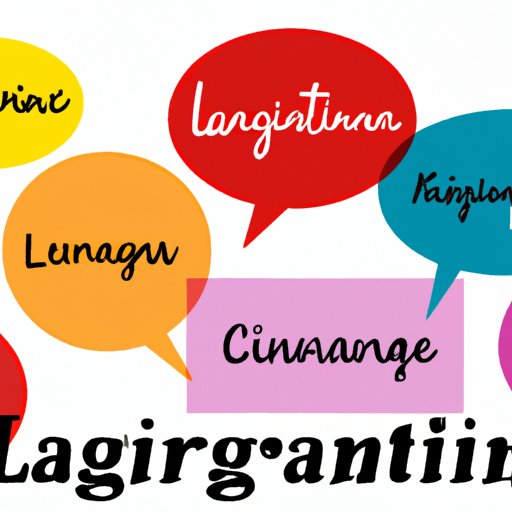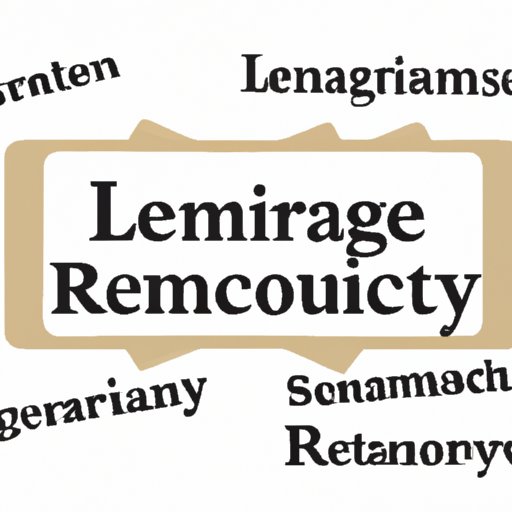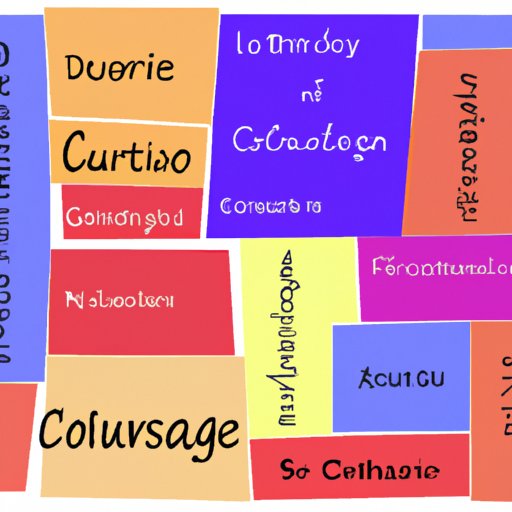Introduction
Language and culture have a deep and complex relationship. On one hand, language both reflects and constructs culture, and on the other, it is heavily influenced by culture. In this article, we will explore the ways that language impacts culture and vice versa, including how language shapes cultural identity, affects cultural norms and values, facilitates intercultural communication, influences artistic expression, and preserves cultural heritage.

Examining the Influence of Language on Culture
How Language Shapes Cultural Identity
Language is a core component of any culture. It is the primary way that a culture’s values, beliefs, and customs are shared and passed down from generation to generation. As such, language plays an important role in shaping the identity of a culture. It is the primary means of communication within the culture, and it often serves as a symbol of the culture’s distinctiveness.
For example, the Navajo language is seen as a symbol of the Navajo people’s unique identity, and it is used to express their values, beliefs, and customs. The language also serves to unite the Navajo people, as it is a powerful tool for connecting with their history and culture. Similarly, the Irish language is seen as a symbol of the Irish culture, and it is used to express their unique values and beliefs.
Effects of Language on Cultural Norms and Values
In addition to shaping cultural identity, language also has an effect on the norms and values within a culture. For example, certain words or phrases may be used to express ideas or concepts that are specific to a particular culture. This can shape the way that people within the culture think and act, as they may come to accept certain norms and values based on the language they use.
For instance, in some cultures, certain words may be used to describe family members in a positive light. This can create a sense of respect and appreciation for family members, which could then lead to the adoption of values like loyalty and support within the culture. Similarly, certain words may be used to describe gender roles or marriage, which could influence the way that people within the culture view these topics.

Exploring the Role of Language in Intercultural Communication
Impact of Language Barriers on Intercultural Dialogue
Language also plays an important role in facilitating intercultural dialogue. When different cultures interact, language can serve as a bridge to understanding, allowing people to communicate and share ideas. However, when there is a language barrier, it can be difficult for people to understand each other, leading to misunderstandings and confusion.
For instance, if two people from different cultures are speaking different languages, it can be difficult for them to effectively communicate their ideas. Additionally, if one person does not understand the language of the other, it can make it difficult for them to comprehend the other’s point of view, leading to disagreements and even conflict.
The Role of Language in Facilitating Cross-Cultural Understanding
On the other hand, when people from different cultures are able to communicate in a common language, it can help to bridge the gap between them and facilitate cross-cultural understanding. By speaking the same language, people are able to share their ideas and learn from each other, which can lead to increased mutual understanding and respect.
For example, if two people from different cultures were able to communicate in a common language, they would be able to share their perspectives and experiences, which could lead to a greater appreciation of each other’s cultures. Additionally, by communicating in a common language, they would be able to more easily resolve any disagreements that arise.
Investigating the Relationship Between Language and Artistic Expression
How Language Influences Creative Expression
Language also plays an important role in artistic expression. Language can be used to convey ideas and emotions, and it can be used to create works of art that reflect the values and beliefs of a culture. As such, language is an integral part of any culture’s artistic expression.
For example, certain words or phrases may be used to evoke specific emotions or ideas. These words or phrases can then be used by artists to create works that reflect the values and beliefs of their culture. Additionally, language can be used to tell stories and to share experiences, which can be used to create works of art that capture the essence of a culture.
Examples of Language’s Role in Artistic Expression
Language’s role in artistic expression can be seen in many forms of art, including literature, music, and visual art. For example, in literature, authors often use language to convey ideas and emotions, and to tell stories that reflect the values and beliefs of their culture. Similarly, in music, lyrics are often used to express ideas and emotions, and to tell stories that reflect the values and beliefs of a culture.
Additionally, language can be used in visual art to convey ideas and emotions. For example, certain symbols or images may be used to represent certain values or beliefs. These symbols or images can then be used by artists to create works that reflect the values and beliefs of their culture.

Analyzing the Correlation Between Language and Cultural Memory
How Language Preserves Cultural Heritage
Finally, language plays an important role in preserving cultural heritage. Language is the primary way that a culture’s values, beliefs, and customs are shared and passed down from generation to generation, and it is the primary means of communication within the culture. As such, language is essential for preserving cultural heritage.
For example, in many cultures, traditional stories and folktales are passed down through the generations by word of mouth. These stories often contain important lessons and values that are specific to the culture, and they serve as a way to preserve the culture’s history and traditions.
Examples of Language’s Role in Cultural Memory
Language’s role in preserving cultural heritage can also be seen in other forms, such as written documents and oral histories. Written documents, such as historical records and legal documents, provide valuable insight into a culture’s past, and can be used to better understand the culture’s values and beliefs. Similarly, oral histories are a form of storytelling that can be used to pass down a culture’s history and traditions.
Additionally, language can be used to preserve cultural artifacts, such as artwork, monuments, and artifacts. These artifacts can provide valuable insight into a culture’s history, and can be used to better understand the culture’s values and beliefs.
Conclusion
In conclusion, language and culture have a deep and complex relationship. Language both reflects and constructs culture, and it is heavily influenced by culture. This article has explored the ways that language impacts culture and vice versa, including how language shapes cultural identity, affects cultural norms and values, facilitates intercultural communication, influences artistic expression, and preserves cultural heritage.
By understanding the relationship between language and culture, we can better appreciate the ways in which our language shapes our identity, values, and beliefs. Furthermore, we can use language to foster cross-cultural understanding and to preserve our cultural heritage.
(Note: Is this article not meeting your expectations? Do you have knowledge or insights to share? Unlock new opportunities and expand your reach by joining our authors team. Click Registration to join us and share your expertise with our readers.)
